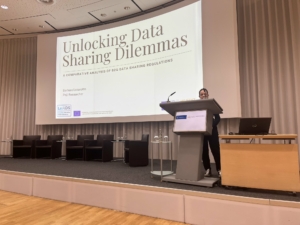Navigating the Data Sharing Dilemma: ESR Barbara Lazarotto at Global Data Law

On December 07-08, 2023, Barbara Lazarotto attended the Global Data Law Conference Series: Comparative Data Law, a conference that addressed the critical role of data as a central and versatile resource in the 21st century, shaping the competitiveness of economies and societies. Co-organized by the University of Passau Research Centre for Law and Digitalisation (FREDI) and the Max Planck Institute for Innovation and Competition, the conference emphasizes a contextual and decolonial comparative law approach, considering cultural, economic, and infrastructural dimensions of data governance. The event is the final installment of a three-tier conference series on Global Data Law, contributing to a broader research agenda on Global Data Law and policy.
 Barbara presented her research titled “Unlocking Data Sharing Dilemmas: A Comparative Analysis of Business-to-Government Data Sharing Laws and the European Data Act Proposal”, a presentation that aimed to explore the delicate balance between sharing and accessing privately held data by governments and the data monopolies held by big tech companies.
Barbara presented her research titled “Unlocking Data Sharing Dilemmas: A Comparative Analysis of Business-to-Government Data Sharing Laws and the European Data Act Proposal”, a presentation that aimed to explore the delicate balance between sharing and accessing privately held data by governments and the data monopolies held by big tech companies.
Her presentation focused on examining the intricacies of business-to-government data sharing, drawing parallels between the structural choices found in existing United States municipal rules and those outlined in the EU Data Strategy. Barbara explored The Data Act’s proposal of compulsory data-sharing hypotheses for local governments, particularly municipalities, to address the unequal distribution of data benefits. She highlighted the strong resistance from the private sector, mirroring similar debates in the United States where various cities implemented business-to-government data-sharing rules.
 Barbara’s presentation also delved into the potential advantages of redistributing data value to society. She emphasized the opportunity to challenge the status quo and break down data monopolies, creating a more equitable system where the benefits derived from privately held data are shared with the broader community. This exploration was identified as crucial for policymakers seeking to strike a balance between fostering innovation and protecting individual privacy.
Barbara’s presentation also delved into the potential advantages of redistributing data value to society. She emphasized the opportunity to challenge the status quo and break down data monopolies, creating a more equitable system where the benefits derived from privately held data are shared with the broader community. This exploration was identified as crucial for policymakers seeking to strike a balance between fostering innovation and protecting individual privacy.
The conference proceedings will be published by Springer Verlag in the series „MPI Studies on Intellectual Property and Competition Law“ in 2o24.




